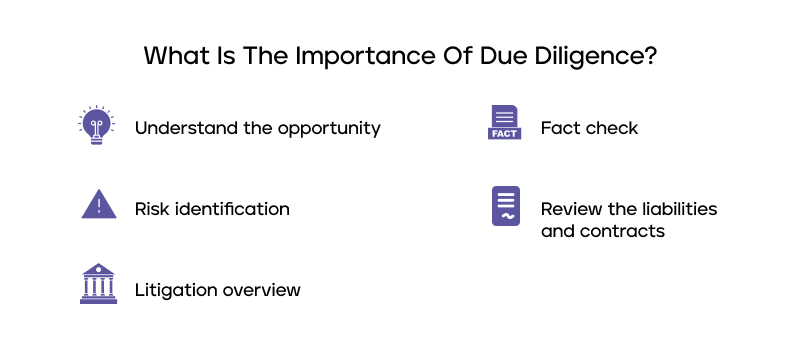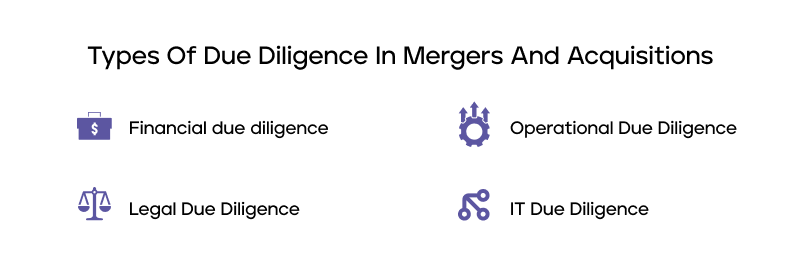The role of due diligence in mergers and acquisitions
Due diligence in mergers and acquisitions is an essential and inevitable activity. It allows the buyer and seller to feel assured that their expectations regarding the transaction are correct and also helps them make an informed decision.
By teammarquee . June 13, 2022

In the mergers and acquisitions transactions, due diligence allows the buyer to gather apt information like – contracts, finances, debts and customer base about the seller. With the help of this knowledge, the buyer is better equipped to make an informed decision and close the deal with a sense of certainty.
Acquisition due diligence is extremely important while purchasing a business, if this process is not executed, it substantially increases the risk to the purchaser. Due diligence in mergers and acquisitions is initiated when the letter of intent is signed.
Mergers and acquisitions (M&A) is an approximate $3.6 trillion event that alters the long-term outlook of industries, companies, and even individual careers. We, at Marquee Equity, are highly involved in the merger and acquisitions space and thus have made a guide for those in the business domain to understand the two concepts intimately.
Continue reading to learn all about mergers and acquisitions due diligence, its importance and the steps involved during the M&A process.
What is M&A Due Diligence?
Due diligence is an inevitable process in mergers and acquisitions transactions. It is a kind of audit and investigation activity that provides the consumer with the guarantee and satisfaction of what they are buying. In simple words, due diligence is all about verification and fact checking on a claim, business, or situation.
Before buying any business it is very important to investigate the business opportunities in order to verify that all the figures and financial information claimed by the other party are factually correct. You need to be certain that there are no risks and possible areas of concern that have not been disclosed.
The M&A due diligence process should be executed before signing a contract. It generally begins when the letter of intent (LOI) is signed. During the due diligence process, a thorough research is conducted to make sure that all facts come out before entering into a financial transaction. In a company’s acquisition, due diligence usually includes a full understanding of the company’s obligations, such as their liabilities, lease agreements, etc.
Now that you understand what due diligence is, let us move ahead and discuss why due diligence is important.
What Is The Importance Of Due Diligence?

As discussed earlier, due diligence is of high importance before signing a business contract. Let us dive deep into the role of due diligence.
1. Understand the opportunity
To make sure that the deal or investment opportunity complies with the investment criteria of the buyer, you need to gather information like –
- Who are the top 20 consumers and what revenues are generated from each one of them?
- Will there be any issue in retaining the customers after the acquisition?
Such questions will help you understand the consumer database and understand if this is the opportunity that will be a great fit for you.
2. Fact check
Due diligence allows us to confirm and verify information that was brought up during the deal. It is essential to assess the legal and financial facts of the transaction. You need to be aware about the EBITDA and have the adjustments to EBITDA been appropriately calculated? This is particularly important if the buyer is obtaining debt financing.
3. Risk identification
You need to identify potential defects in the investment opportunity and further avoid a bad business transaction. Verifying data and details that might be significant to the drafting of the acquisition agreement is crucial. Therefore, identifying risks beforehand and mitigating them should be a deal breaker.
4. Review the liabilities and contracts
Reviewing the material contracts is a time consuming but a critical process. It is important to ascertain liabilities that may be deal breakers for you. The categories of contracts that are crucial to review include – loans, leases, credit agreements, supplier contracts, agreement of partnership or joint ventures, past acquisition agreements, license and franchise agreements, sales agency and advertising contracts, etc.
5. Litigation overview
You need to have an overview of pending, threatened or settled litigation involving the seller. This process should be undertaken very seriously and must involve – pending litigation, settled litigations and the terms of settlement, claims threatened against the seller and matters in arbitration or mediation, etc. This will help you understand what business you are going to purchase and how it will affect you.
You now have a working understanding of the mergers and acquisitions due diligence checklist. While executing the above mentioned actions, you can mark them off your checklist and be firm of the business decision you are going to pursue.
Types Of Due Diligence In Mergers And Acquisitions

A potential business deal involves different types of due diligence in mergers and acquisitions. Let us walk through the types of due diligence that will need to be accomplished as part of the process.
Financial due diligence
During financial due diligence, you need to scrutinize the finances of the targeted business – revenue analysis, business operations review, gross profit margin analysis, working capital and debt overview, review financial statements, etc. Identifying key strengths, researching and exposing potential deal breakers is crucial during this step.
Legal Due Diligence
Evaluating the legal aspects of the target company and identifying potential legal risks is a critical process during merger and acquisition steps. A detailed legal due diligence report highlights the legal aspects and helps you in mitigating potential areas of conflict.
Operational Due Diligence
Operations is a very important aspect of any organization hence, it is important to assess potential risks and mitigate them. Operational failures can harm the of the entire company and can be ensured via: HR, IT, manufacturing and production management, marketing review, warehouse and supply chain management.
IT Due Diligence
Analyzing the company’s technical capabilities will help you immensely. During managing any business, IT and software play a major role. It is crucial to identify and understand possible compatibility difficulties arising from a target company’s use of incompatible software.
Conclusion
An M&A transaction can be an extremely complex process thus, the due diligence process in mergers and acquisitions is a critical step. It requires the buyer and its advisors and accountants to undertake a significant amount of due diligence. Also, sellers have to be prepared for these due diligence activities and ensure that the process proceeds smoothly and quickly, serving the best interests of all parties to the transaction.
Confused on how to go about your M&A deal? Let Marquee Equity help you out. We understand that foreseeing a 1 year financial plan is not enough, so we help you create a 5-10 years financial projection. Not only this, we help create any other due diligence documents that give a clear picture for a business transaction. Reach out to us, today!
We optimize & accelerate growth for already great products.

Business Investors Near Me: A Local Perspective
Local investors are the heartbeat of community-driven growth. Beyond funding, they bring insights, connections, and shared values. In the nexus of business and locality, their presence becomes a catalyst, propelling businesses to thrive within the unique tapestry of our local landscape.









